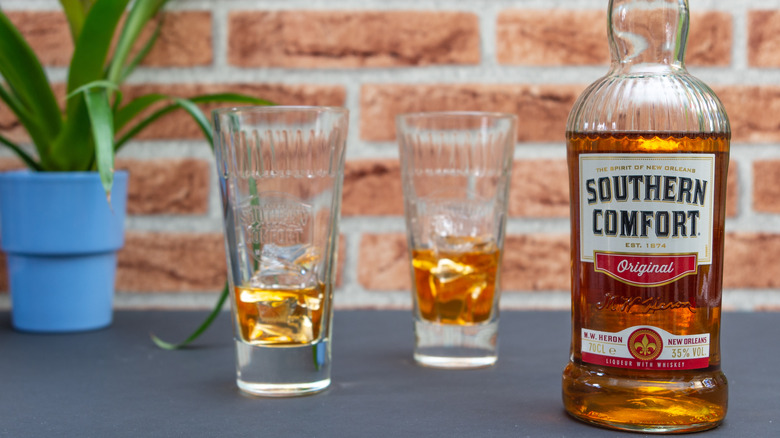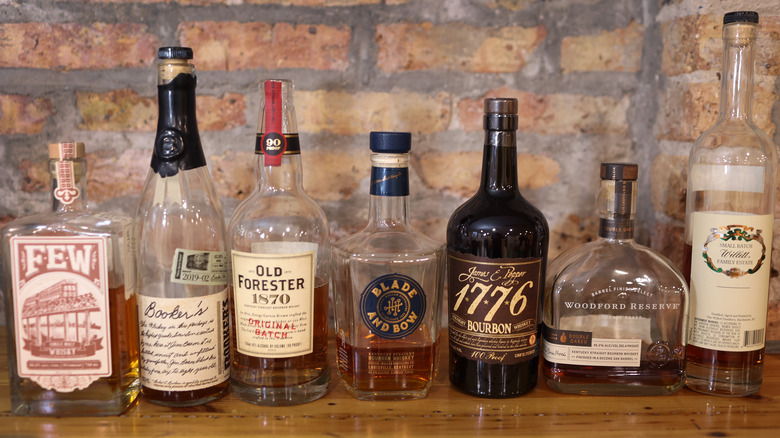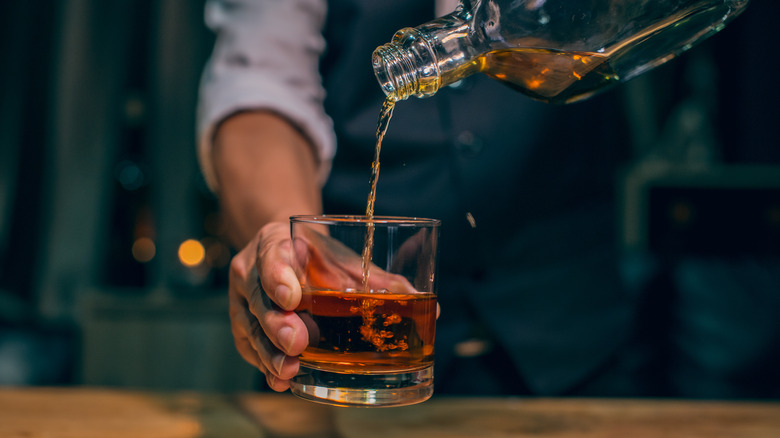The Reason Southern Comfort Doesn't Count As A Whiskey
For many, Southern Comfort (SoCo) was considered their first introduction to the brown distilled spirit category. Popularized in the 1940s by the cocktail named after the title character, Scarlett O'Hara, in the Hollywood blockbuster "Gone With the Wind" and again in the 1960s by the late rockstar Janis Joplin who took shots on stage, Southern Comfort developed a cult following. But, despite being referred to as a whiskey, Southern Comfort does not fall under that classification.
Created in 1874 by M.W. Heron in New Orleans, Southern Comfort was blended by the bartender to be a smoother version of whiskey, eliminating the harsh burn associated with the liquor. Originally called Cuffs and Buttons, Southern Comfort combined stone fruit and spices with lower-quality whiskey, making it officially a liqueur, not a straight whiskey.
As this spirits category continues to gain popularity, consumers can find domestic and international whiskies from top producers and small-batch manufacturers in the same aisle. Despite technicalities, liquor stores commonly market Southern Comfort beside other domestic whiskies like Jack Daniels and Maker's Mark bottles; however, the brand does not meet the U.S.'s legal definition of whiskey. Where it's produced, how it is aged, and what type of grain is used determines what it can be legally called.
The definition of whiskey
In the United States, spirits are regulated by the Alcohol and Tobacco Tax and Trade Bureau (TTB). This government body sets the guidelines for alcohol sold in the U.S. and whether a spirit can be labeled a whiskey or whisky. The current distilled labeling requirements state that whiskeys need to be "distilled from a fermented mash of grain at less than 95% alcohol by volume (190 proof) having the taste, aroma, and characteristics generally attributed to whisky and bottled at not less than 40% alcohol by volume (80 proof)." Southern Comfort Original is 21% ABV.
Under that umbrella, over 40 types of whiskey are distilled from corn, rye, wheat, or barley. Each whiskey type has standards stating whether the spirit can contain neutral spirits like vodka, coloring, flavoring, and additional blending materials.
Until recently, the issue of whether SoCo was a whiskey was moot. For almost a century, Southern Comfort was created without any whiskey added. After Prohibition and during World War II, whiskey ingredients were hard to procure, so the new company owner, Francis E. Fowler, used a cheaper neutral grain spirit instead and added a whiskey flavoring. It wasn't until the New Orleans-based brand Sazerac, who owns Buffalo Trace Distillery (makers of Pappy Van Winkle and Blanton's), bought Southern Comfort in 2016 that production started using a whiskey base again.
Why is this liquor considered a liqueur?
Like rum, vodka, and gin, Southern Comfort is a distilled, alcoholic beverage known as liquor. What prevents it from technically being a whiskey is the addition of flavorings to the spirit, classifying it as a liqueur or cordial. Since Sazerac bought the brand, whiskey has been used as the grain base, but it continues adding signature flavorings like stone fruit and spices to create its peachy-tasting original blend.
Unlike straight whiskey, liqueurs like Southern Comfort are sweetened, changing the flavor and texture. Liqueurs tend to be thicker and heavier than other liquors, with sweetness as the dominant taste. Adding ingredients to the blend, liqueurs traditionally contain less alcohol by volume than other liquors. The Alcohol and Tobacco Tax and Trade Bureau requires whiskey to be at least 40% ABV; as stated, Southern Comfort Original is 21% ABV compared to Jack Daniel's, which is 40% ABV. The brand's newer labels, Southern Comfort 100 Proof (50% ABV) and Southern Comfort Black, which is 80 proof (40% ABV), meet the TTB standards.
Like bourbon, Southern Comfort is associated with the South, which appeals to many: It is produced in Kentucky. Southern Comfort can be enjoyed neat or in various cocktails with a twist like a Southern Manhattan, Southern Whiskey Sour, or Comfort and Cola.



